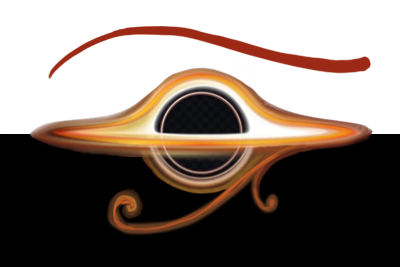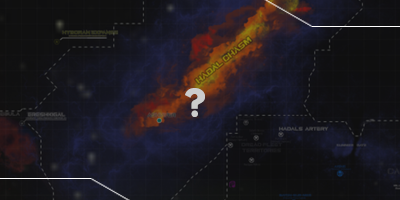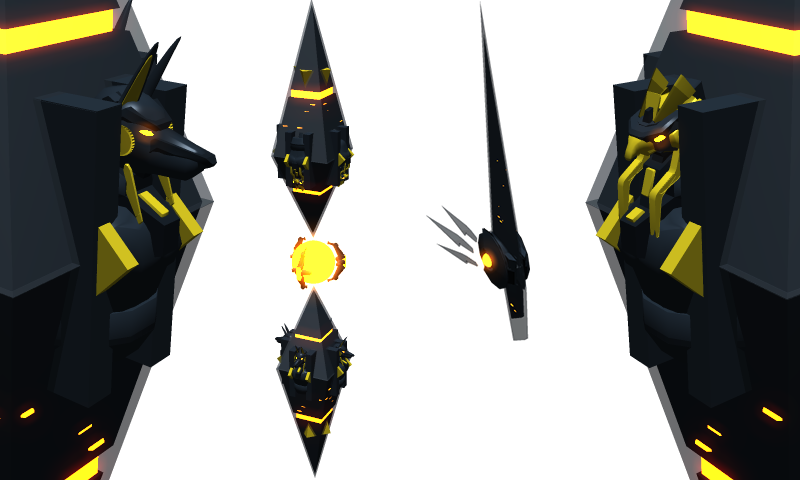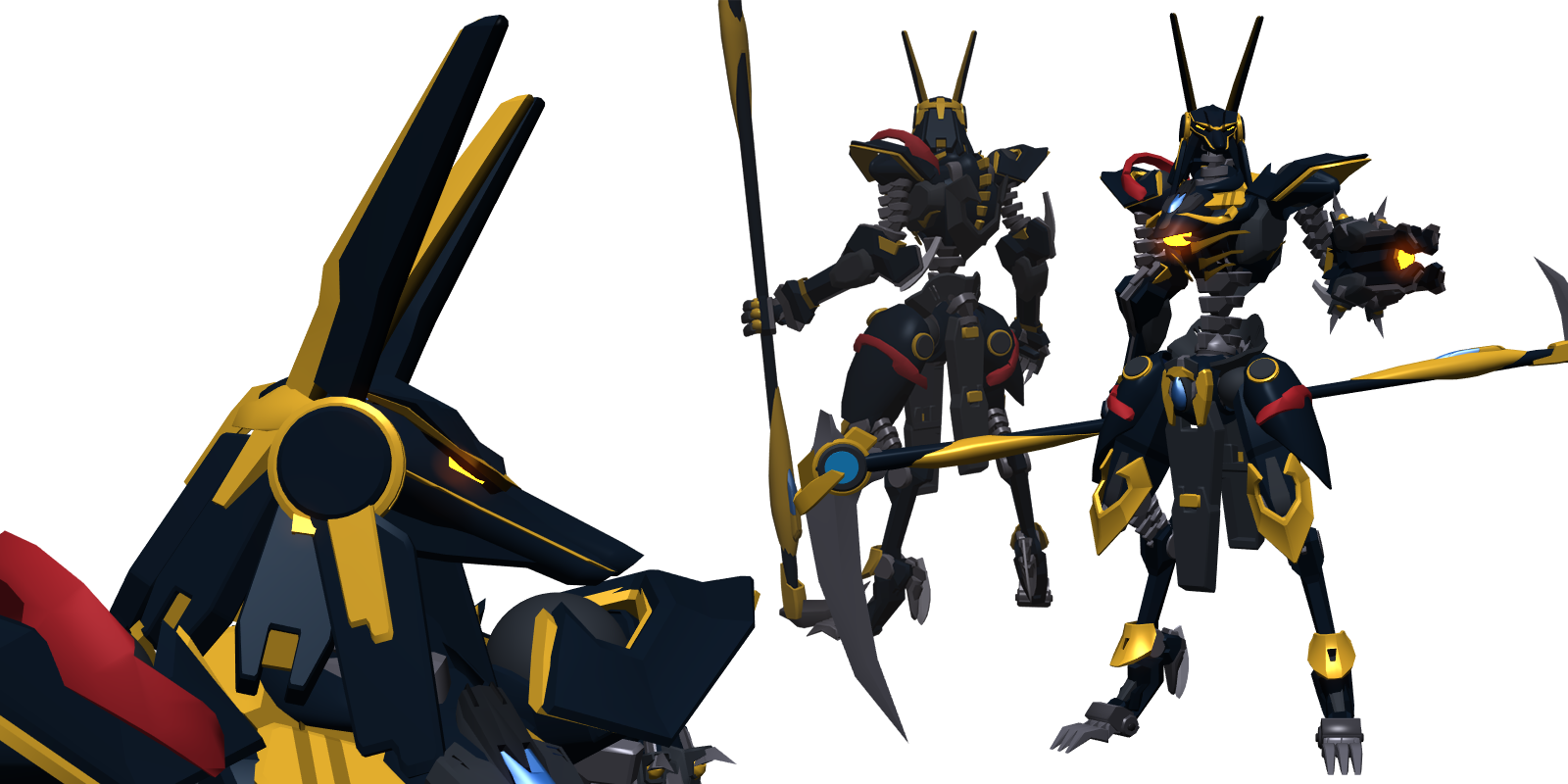Ankhet, the Eternal Empire
 |
|
| Nation Info | |
|---|---|
| Motto | ie, “In God We Trust” |
 |
|
| Home System | |
| Capital | abydos |
| Official Language | Corspic |
| Species | Akhar1) |
| Government | Theocratic Monarchy |
| Strengths | Adaptive Technology, Technophage |
| Weaknesses | Faith-constricted Approach to Warfare, Set in Their Ways |
Table of Contents
Glory to the Immortal Empress!
The Ankhet2) are fanatical purifiers bent on eradicating all sentient life from the sector.
While they once inhabited organic bodies, they converted all animal life on their world into machine bodies in ages past. “The Great Crossing” that stripped them of their natural life also bestowed on them a divine mandate - to make sure that no other higher lifeforms in the galaxy are allowed to develop unchecked.
Influences
Draws heavily from Ancient Egyptian culture and religion, with additional influences from Horizon: Zero Dawn, Zoids, and others.
The Ankhet and their creation are robots that mirror organic forms. Their bodies are covered in shifting plates of metal that protect and conceal the mechanical workings underneath. The Ankhet are frequently decorated in fine filigrees of golds and silvers, while their creatures tend towards stark white plates with minimal accents. They blend industry with a beauty drawn from Ancient Egyptian aesthetics and the shapes of the natural world.
History
For much of their history, the Ankhet worshipped Aten above all others. Like their pre-eminent god, they revered balance (“ta'am”), creation, and new life. As their civilization progressed, these core values went unchanged for millennia and the Ankhet embraced ta'am in many ways. Their world was harsh, but fair - its nutrient-rich rivers spurred on vibrant life on their shores, but the harsh sands beyond could just as easily take that life away. The balance between life and death was ever-present, but for most it was something that warranted respect - not fear.
The advent of a prolific flesh-eating virus changed that. It spread with no concern for species barriers. All animal life on their world was affected. Friends and family were eaten alive by the virus and, despite their advancements, no cure for the virus could be found.
A radical plan was put forth that used recovered technology from a civilization even more advanced than their own - they would fight the organic virus with a technological one. For every bit of flesh that the virus ate away, it would be replaced by machinery.
Their people would survive, but at great cost.
As the virus, now known as 'Anothis' Fire', burned through their world, a new world was created. In the face of so much destruction, their faith shifted to Nephti - a god of death and decay, but also renewal. The belief that life had gone unchecked for too long became more and more prevalent as the A'khar came to terms with their new reality. They had been given a great trial and come out the other side with powerful, immortal bodies - and a divine mandate to continue the purge of higher lifeforms, in their god's name.
Demographics
While much of the A'khar died off in the plague, those that didn't were left in timeless bodies. With no need for food or other creature comforts, the remaining population has instead focused on spiritual, artistic, or military pursuits, depending on the caste they held in life.
Population
The total population of the Ankhet is the same as it was millenia ago, after the Great Crossing gave them their new forms. When a body 'dies', either from wear-and-tear, accident, or a violent end, it is trivial enough to transfer that A'khar into a new body.
While greatly reduced from the height of their civilization's size, they are nonetheless a populous people who have spread across their nearby stars.
Religion
The religious beliefs of the Akhar are heavily influenced by the world they developed on. Largely covered by harsh, unforgiving deserts, they prospered along the rivers and lakes that served as cradles of life on Abydos. The sky above was dominated by the sun during the day, then gave way to a dazzling view of a nearby blackhole slowly consuming two stars in the night sky.
They knew that one gave life and the other, should it meet their own star, would surely take it away. This mirrored their own lives, where the presence of water and the sand it held back could mean life or death.
Gods
The Ankhet have a variety of creation stories, though all agree that Aten and Nephti were created by Mamut. Mamut was alone in the void and sought to rid itself of its loneliness. It created Aten, who would rule over birth, growth, and daylight, and Nephti, who would rule over death, decay, and the night. These two first gods had children, who each ruled over some other aspect of the Ankhet world.
Each Akhar god has a counterpart. Each god, left unchecked, could lead to ruin. Not because they are good or evil, but because the Ankhet strongly believe in the concept of ta'am - balance. Without Nephti to decay and kill, Aten's growth would overrun their world until it consumed all of its resources. Nothing would be left. And so while Nephti could be seen as a destroyer, she was also a renewer. Aten, who represented life, could also represent unchecked growth, like a cancer.
For much of their history, the Akhar followed their principles of ta'am to ensure that life flourished, but not unchecked. Their people grew, their farming techniques advanced, and eventually they possessed technology that allowed them to travel to the heavens themselves.
The Great Plague that struck their people changed their view on balance, but did not destroy it. It became clear that they had not done a sufficient job in culling life. They had clung to Aten too tightly and been rewarded with a terrifying plague that threatened not only their civilization, but all creatures on their world. Only by turning to Nephti - by casting away their living bodies and killing off all unchecked life that they find, could they restore balance once more.
Eternity
There is no concept of an afterlife in the Akhar religion. There is a notion of continuance, that some part of you continues and is reborn, but there is no true world between for the people of Ankhet. At the end of their lives, an Akhar is judged for their deeds and misdeeds in life. If their life was found lacking, they would be extinguished and no longer be part of the cycle of rebirth.
This approach to Eternity and worthiness has changed little since the Great Plague, but it has raised questions about their newfound ability to live for thousands of years and occupy new bodies. For some, they think that their long lives are a gift from Nephti for following her ways. For others, they worry that when their deeds are eventually weighed, the mistakes made over their long life will be too much.
Military Culture
While the Ankhet have an abundance of craftspeople of all types, the majority of their culture centers around their military and its driving purpose. They view the sector as something like a garden that requires regular pruning if life is to survive. For the Ankhet, any branches, flowers, or weeds that grow outside of their appropriate place should be cut back immediately before things get worse.
Accordingly, they spend a great deal of time training and developing new weapons for war. Each Ahkar warrior is a true master of their craft with at least a thousand years worth of experience.
Perhaps because of their origins, Ahkar wear little armor beyond that which is part of them. Most will use a shield if their weapon of choice allows it. Armor finds its place on unit leaders and those in higher ranks, though it is only worn when they are going to war.
Ahkar respect those who put up a good fight, to the point that they will intentionally leave stronger enemies alive so that they can fight them again in the future. They call this “honing the blade”, though outsiders debate whether the blade being sharpened is the enemy or the Ahkar. They have no interest in granting mercy to anyone who has not earned the right.
For larger scale conflicts, especially the purging of the other inhabitants of the Calliope sector, the Ankhet will often send only the minimum that their war leaders believe to be necessary to defeat their foe. Should they be defeated, they will give their opponent time to recover before sending a larger force. They continue this way until either the foe is defeated or they are forced into a larger engagement.
Government and Politics
Ankhet is a theocratic monarchy. The Immortal Empress saw their people through the trial of the Great Plague and, like her ancestors before her, proved that her mandate to rule was ordained by their gods. Even further, the plague did not completely strip away all of her flesh like it had done to so many others. This, too, was a sign that she was favored by the gods.
Administrator-priests handle much of the rule at the local level.
While there is an abundance of politicking behind the scenes, the memory of the A'khar has always been long. Especially now that they are effectively immortal, great care is taken to avoid offense. Decisive action is rarely taken without a sign from their gods or order from their Empress, for fear of drawing ire that will follow someone for millennia into the future.
The word of the Immortal Empress is law. To disobey her is to not only disobey the ruler of their people, but also to go against the will of their gods.
Look
Akhar
In life, the Akhar were humanoids with canin/felid features. The nails of their hands and fingers were more pronounced and sharp compared to that of a humans'. Their ears were situated atop their heads and rose up high, often to a sharp point. Their canines were likewise more pronounced. Their legs were digitigrade, such that it would seem to a human as though they were walked on their flats of their toes.
The Great Crossing changed many things, but their bodies were among the first and most drastic changes. Their skin was replaced by hard plates, their muscles with servos and pistons, and their bones with dense metal structures. They became stronger, faster, and significantly more durable - but only the general shape of their living bodies remained.
As the ages have passed, the Akhar have taken on varied bodies to suit their tasks.
It is exceedingly rare for any outsider to meet an Akhar who has retained any of their organic appearance, to such an extent that many would doubt they ever had one at all.
Architecture
When a society with a penchant for massive, elaborate structures and art projects that last a lifetime is given eternal life and untiring bodies, they double down. The Eternal Empire has no shortage of statues, buildings, and art installations that reach to the heavens and beyond. Stark lines are prevalent in their buildings, but every inch of their creations shows a mastery of their crafts. Stories and scriptures exalting their gods and their leaders are delicately carved into most of the surfaces of their works.
For many Akhet, these projects are what gives their life meaning. They challenge themselves time and again to create true wonders. Accordingly, the places of their worlds are full of such wonder that it can be hard to comprehend the sheer scale and awe before you.
Each creation is given the space it requires to achieve maximum impact. The Empire has been known to claim worlds simply for their artistic potential.
Ships
Akhet spacecraft are massive and vertical - their smallest ships are kilometers tall and blade-like in appearance. The exteriors are covered in a material that looks like smoky black glass, distant lights under the surface hinting at the activities within. On closer inspection, this glass is segmented like other Akhet creations and can shift and react to changing conditions.
Only shuttles, transports, and fighter craft are smaller. These share the same general look and style as their parent craft on a smaller scale.

Fighting Craft
While smaller craft exist within the Empire, most of the fighting is done by either titanic warforms and/or smaller, humanoid-sized robotic war beasts.
Warforms vary in size from thirty meters to above one hundred, though their designs tend to remain consistent. Most warforms honor one of the Ankhet's gods with their design. Like their smaller counterpart, even the largest of warforms are surprisingly adaptable and nimble. Their limbs and bodies reconfigure into whatever weapon or feature they require; lost parts can be reattached or reconstituted from other Ankhet technology.

Weaponry
Ship and vehicle-based weaponry seems to appear as needed, drawing upon nearby or dormant components. If necessary, individual units will attach to larger craft and become weapon emplacements.
Ankhet warriors have been seen to pick up smaller robots, who shift into weapon forms on the fly. Discarded, but functional, weapons produce heads and legs and join the fight on their own.
Sound
If you're looking for some inspiration music for the Ankhet, here's a few:
Threat
The Eternal Empire represents a significant threat to all higher forms of life in the Calliope sector. They have made it their primary purpose in life to purify the sector of all higher life.
They are technologically advanced and possess sufficient military strength that they can sustain a full-scale war on multiple fronts against opponents with strength comparable to that of the current shards. Only their religious need to seek balance - even in warfare - keeps them from immediately eradicating all the life that they find.
The Technophage
The specific details of how the technophage came to be are known only to a few in the Ankhet. What is widely known is that it was created in response to a deadly, flesh-eating plague.
Whether the technophage is an adapted version of that same plague or something else entirely, it displays traits similar to both a disease and a computer virus. Left unchecked in organics, it can convert limbs or even entire bodies in as little as an hour, rarely more than a day. Technology is similarly affected, though not always in as drastic a fashion.
With appropriate countermeasures, the technophage can be resisted for a short time. Once it is halted, the technophage no longer converts flesh and metal into its own likeness - but any damage that has been done remains. Robust anti-virus systems and immune boosting systems are reasonably effective against the technophage, such that only the weak, damaged, or unprepared need be truly concerned about it.
If not halted before the virus is able to alter a subjects mind or controlling systems, the infected quickly become loyal to the Eternal Empire and begins to act in what it believes to be the Empire's best interests. This has caused infiltration by sleeper agents in target empires that not even the Empire was aware of until they made their moves.
All Ankhet technology relies on the technophage for its assembly, repair, and operation. Anyone attempting to analyze or reverse engineer their technology quickly finds their own tools turned against them.
Strengths and Weaknesses
Ankhet technology is durable and highly adaptive. Parts will reconfigure themselves into more advantageous forms as needed, potentially creating entirely new weapons or systems. So long as they have sufficient mass, they can use this adaptability to reconstitute lost components. They can even reclaim discarded or damage parts from other Ankhet creations and use those to rebuild themselves.
The technophage that created the modern Ankhet is still part of their systems even today. Its design and mechanisms are largely inscrutable to others, but any who interact with Ankhet technology run the risk of spreading it to their machinery and organics alike. Unless stopped, it will attempt to convert what it comes in contact with into more Ankhet technology, potentially even subverting the very forces that the Ankhet are fighting against.
They are not impervious to damage, whether it be from technological or magic sources, but they are surprisingly hardy. Even their grunt units can prove a challenge for a skilled force, shrugging off damage that would easily down a similarly sized allied unit. Once wounded, they continue to crawl forward in an attempt to finish their task.
Rumors and Quests
Quests
- The Eternal Empire is happy to promote strife in the sector. They fund numerous mercenary and bandit groups.
- The many worlds of the Ankhet are full of dangers - but also many treasures for those bold enough to seek them out.
Common Rumors
- While the Ankhet seem genocidal, they readily trade with others, especially those who deal in fine arts.
- The Ankhet respect strength above all other things. If they consider you to be worthy, they might not kill you. For now.
Uncommon Rumors
- The Eternal Empire is one of the greatest military strengths in the Calliope Sector.
- A strange code of honor prohibits the Ankhet from destroying another empire without attempting to make the combat fair. Initially.
- Anyone that the Ankhet deem too dangerous are exempt from this code, due to their religious beliefs taking precedence.
Rare/Unsubstantiated Rumors
- The Immortal Empress was behind the disease that led to the conversion of her people, as a way to secure her power.
- Not all of the Akhar are robots - some still walk in flesh and blood.
OOC
- Player Whisper created this on 2022/10/12 08:53.
Usage
This content adheres to Project Multiverse's submission and usage rules.
- This Nation can be used by (anyone/only those with permission/etc).
- In the event that the Nation's managers are no longer available, (the faction becomes an NPC faction managed by the admins/the faction departs or becomes isolated, withdrawing into its home system, etc).
| shard | |
|---|---|
| Shard Name | Ankhet, the Eternal Empire |
| Description | The Ankhet((ahn-kuh-het)) are fanatical purifiers bent on eradicating all sentient life from the sector. Draws heavily from Ancient Egyptian culture and religion, with additional influences from Horizon: Zero Dawn, Zoids, and others. |
| Shard Manager | whisper |
| Is this an active Shard? | No |
